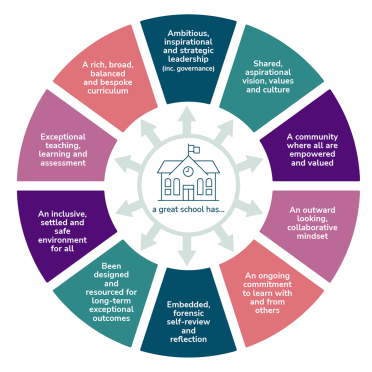The core business of great schools is high-quality learning for all.
- Teachers provide well-targeted challenge and employ excellent classroom organisation and behaviour management skills. They continually seek to improve their knowledge, understanding and skills.
- Staff members have considered collectively what constitutes deep learning at all phases and put in place effective processes and practice and varied teaching techniques to maximise achievement and attainment. They foster a genuine love of and thirst for learning.
- Teachers’ excellent subject knowledge consistently challenges and inspires pupils.
- Learning is carefully planned to meet individual needs, interests and current standard of attainment, so as to maximise pupils’ engagement and enable excellent rates of progress for all (including learners with SEND and the highest attainers).
- Pupils are taught to learn independently. There is opportunity for mastery through practice, preparation, elaboration and exploration. Building independent skills paves the way for future study and life-long learning and seamlessly links one lesson’s learning to the next.
- Assessment for Learning is very well developed and consistently utilised. There are regular opportunities for learning dialogues, self and peer-assessment and diagnostic and developmental feedback, based on accurate and robust pupil performance data.
The constant promotion of self-esteem, through high expectations and ambition, leads to the pupils assuming responsibility for their learning and behaviour. Pupils are encouraged and expected to aim high. They are provided with information, advice and guidance on future opportunities to enable them to make informed and aspirational choices and to prepare for the next stage of their learning.
Enrichment is every pupil’s entitlement: opportunities to learn beyond the classroom inspire and motivate pupils and lead to outstanding achievement.
This lens will typically be reflected in:
- Teaching and Learning Policy
- Enrichment/extra-curricular Policy
- Work Related Learning Policy
- Transition Policy
- CPD Policy
- Monitoring and Evaluation Policy
- Assessment for Learning Policy
- CPD programme and policy
- Lesson Observation and Feedback Policy
- Schemes of learning, long and medium term plans, lesson plans
- Subject team meeting minutes, co-planning documentation and SoL reviews
- Written feedback and marking
- SEND provision map, EIPs, SEND plans
- Pupil Progress meeting records
- Trips and visits records
- Displays and learning environment
- Destinations data
General documents, policies and procedures in which you might typically see the lenses reflected.
Case studies
Resources
-
Summer 2021
The Hidden Lives of Learners – Graham Nuthall, 2007
Teaching Walkthrus – Tom Sherrington & Oliver Caviglioli, 2020
Teaching in the Online Classroom – Doug Lemov, 2020
Making Good Progress? The future of assessment for learning – Daisy Christodoulou, 2017
Responsive Teaching: cognitive science and formative assessment in practice - Harry Fletcher-Wood, 2018
Connect the Dots: the collective power and relationships, memory and mindset in the classroom - Tricia Taylor with Nina Dibner, 2019
Early Childhood and Neuroscience; Theory, Research and implications for practice - Mine Conkbyir, 2017
Autumn 2019
Education Endowment Foundation Teacher Toolkit
How Children Succeed - Paul Tough, 2014
The Expert Learner - Gordon Stobart, 2014
Embedded Formative Assessment - Dylan Wiliam, 2017
Leadership for Teacher Learning - Dylan Wiliam, 2016
Visible Learning for Teachers - John Hattie, 2011
Teach Now! The Essentials of Teaching - Geoff Barton, 2014
How to Teach - Phil Beadle, 2010
Teach like a Champion - Doug Lemov, 2011
This Much I Know about Love over Fear: Creating a culture of truly great teaching - John Tomsett, 2015

Ways in which HFL can provide support
Consultancy and support by subject teams
Training for subject and phases leaders
Subject conferences
Assessment
Behaviour for learning - Wellbeing team
SEND
NQT training
Resources - HFL Shop
Advice from helpdesk on governor link roles, training for governance on data, HFL Governance Conference.
Please contact us for further information on 01438 544464 or email info@hfleducation.org
The Great School Framework is made up of:
Ambitious, inspirational and strategic leadership (inc. governance)
Shared, aspirational vision, values and culture
A community where all are empowered and valued
An outward looking, collaborative mindset
An ongoing commitment to learn with and from others
Embedded, forensic self-review and reflection
Been designed and resourced for long term exceptional outcomes
An inclusive, settled and safe environment for all
Exceptional teaching, learning and assessment
A rich, broad, balanced and bespoke curriculum
The Great School Framework is the intellectual property of HFL Education and copyrighted. It may not be used unacknowledged by others.


